Posts Tagged ‘Entrepreneurship’
072 Why Steve Jobs, Jeff Bezos & many others turned to “The Coach” Bill Campbell
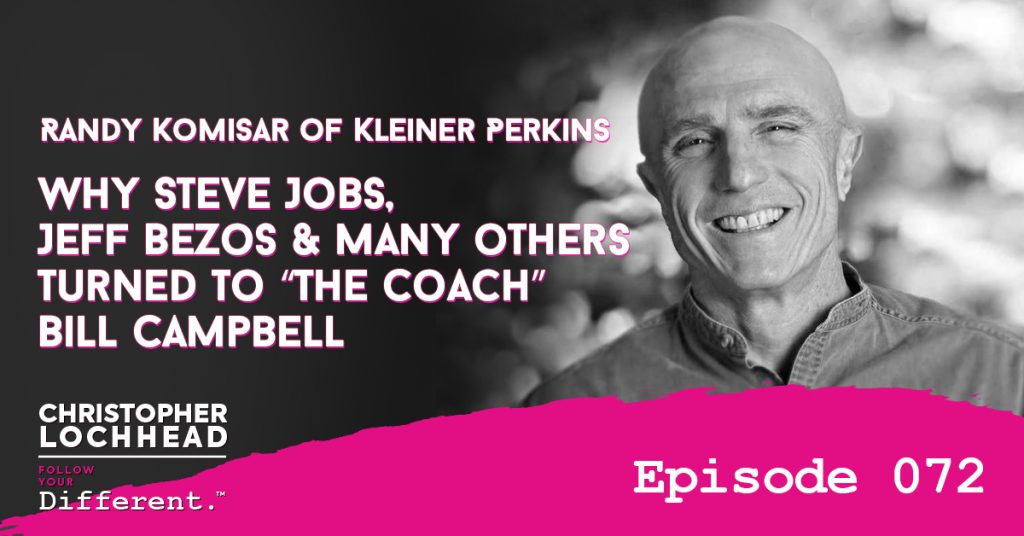
Podcast: Play in new window | Download (Duration: 56:14 — 51.5MB) | Embed
Subscribe: Apple Podcasts | Spotify | Pandora | RSS | More
Randy Komisar of Kleiner Perkins joins us today to celebrate the life and lessons of legendary Silicon Valley coach, late Bill Campbell. Guest Randy Komisar, along with colleague Paul Martino of Bullpen Capital, came together to capture Bill in a podcast. Bill was the coach to Steve Jobs, Jeff Bezos, and countless Silicon Valley legends.
Depicting The Real Bill
Bill was featured in a book called Trillion Dollar Coach, prior to the release of Randy and Paul’s podcast. The content of the book were flattering, but the title was so off-putting. It sets the wrong tone for understanding what BIll is all about.
“Bill wasn’t a guy with a big theory. He’s not that guy who has rules like ‘10 rules to be successful.’ He was somebody who connected incredibly well with who you were and what you need and was able to get you there.” – Randy Komisar
Bill was associated with a trillion dollars worth of value creation. He was not a highfalutin guy who would’ve wanted to be in the cover of a book. They were able to capture the real Bill, more than what the book portrayed him to be, through this podcast.
Paying it Forward
Randy and Paul had the opportunity to learn and share their respect and admiration for Bill and they want to pay it forward, through the production of their podcast. They wish that the entrepreneurs for the generations to come would be able to do the same.
Entrepreneurs could get a lot of inspiration from Bill. Randy even cited that if it was not for Bill, he would have quit business a long time ago.
“Bill made business interesting for me and many people because he made it about people, not money.” – Randy Komisar
Learnings From The Late Bill Campbell
One important point from this discussion was the difference in doing what is right versus what is smart. Bill believes smart people are great at rationalizing. Most of these people, though, still tend to overthink a problem and justify doing the wrong things.
“The right thing and the smart thing aren’t necessarily the same. The right thing is worth doing, but the smart thing needs a lot of consideration. It may be smart because it allows you to do the wrong.” – Randy Komisar
This conversation with Randy Komisar is jam-packed with Bill Campbell’s wisdom in entrepreneurship, people management, Silicon Valley legacy.
To hear more about Why Steve Jobs, Jeff Bezos & many others turned to “The Coach” Bill Campbell and more relevant information from Randy, download and listen to the episode.
BIO:
Links:
Straight Talk for Startups – Book
The Monk and the Riddle: The Art of Creating a Life While Making a Living – Book
Executives Launch Podcast To Pass On Lessons From Bill Campbell, Coach To Silicon Valley Stars
Executives Launch Podcast To Pass On Lessons From Bill Campbell, Coach To Silicon Valley Stars
We hope you enjoyed this episode of Follow Your Different™! Christopher loves hearing from his listeners. Feel free to email him, connect on Facebook, Twitter, Instagram and subscribe on iTunes!
070 Alternative Investing w/ Eric Satz
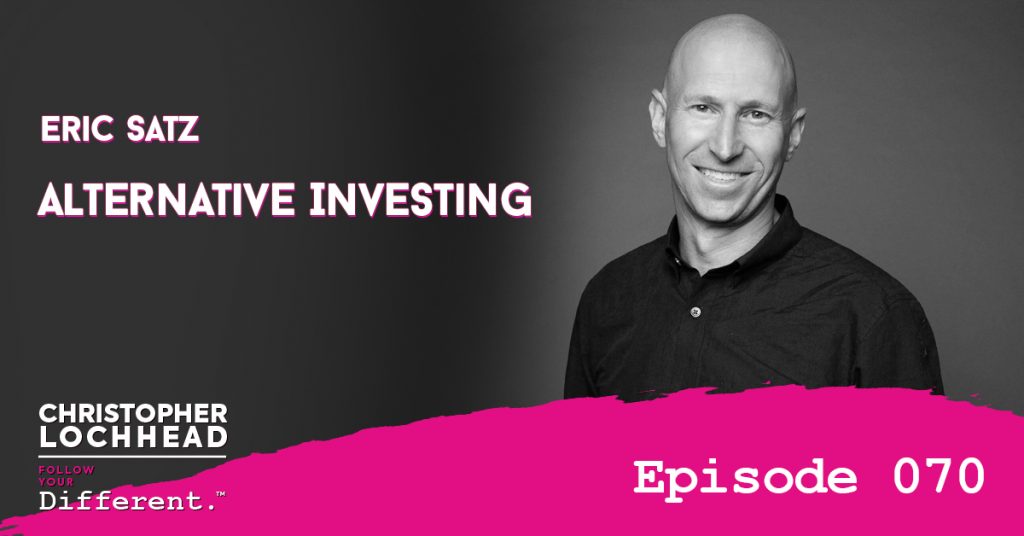
Podcast: Play in new window | Download (Duration: 1:02:11 — 57.0MB) | Embed
Subscribe: Apple Podcasts | Spotify | Pandora | RSS | More
Eric Satz, CEO of Alto IRA and retirement planning advocate, joins us in today’s episode. He is on a mission to enable everyone to invest their retirement money in alternative investments. He actively campaigns for drastic information dissemination among retirees to save them from potential poverty in the future.
Diversifying Investments
Regular listeners might remember the teachings of prior guests like David Osborne or Pat Hiban or Dorie Clark. These smart people recommend a diverse investment strategy that creates multiple income streams over time. Such a strategy will help investors achieve the amazing goal of having investments pay for all expenses.
Eric Satz also promulgates diversifying investments, especially for retirees. He acknowledges the importance of various platforms today, where resources can be easily uploaded and disseminated. Eric and his team from Alto IRA provide information on alternative investments such as private startups, growth companies, real estate, loans, and digital assets and currencies.
“The idea is to open up areas of investment that have the potential to generate higher returns, higher yield and greater levels of current income—so that we are all in a better position to retire.” – Eric Satz
Alarming Truths About Retirement
Eric started his mission with straightforward and entrepreneurial motivation. There is a huge market opportunity of 30 trillion US dollars, sitting in retirement savings. However, only 1% of this amount is invested in alternative assets, instead of around 10 or 20%.
“Investing is proactive, saving is passive. If we don’t change the way we invest, 25 million Americans—elderly Americans—basically will be living in poverty.” – Eric Satz
Eric wanted to fight the conventional wisdom of financial advisors. He considers America to be under a retirement crisis up until 2050. He promotes diversification in investing in businesses commonly considered by upper-middle-class and the elites, like real estate.
Save and Invest
Further, into this episode, Lochhead mentions the importance of having investments while saving on the side.
He further says that retirees should take the opportunity to invest aggressively because of the changing of public-market-private-market dynamics. With a projected 46% increase in capital gains annually, an avid saver can plot his or her retirement early.
To hear more about alternative investing and more relevant information from Eric, download and listen to the episode.
Bio:
Eric Satz, Founder/CEO Alto IRA
An entrepreneur and former investment banker, Eric worked for DLJ/Credit Suisse First Boston before co-founding Currenex, Plumgood Food, and Tennessee Community Ventures, a VC firm.
Eric served on the Board of the TVA from 2015-January 2019, and he teaches an entrepreneurship class to high school students.
A Miami native and diehard ‘Canes and Dolphins fan, Eric went to Amherst College.
After years in NYC and then San Francisco, he and his wife moved to Nashville, her hometown, to raise their kids.
When he’s not breathing life into startup companies, Eric loves to ski, play soccer, and practice yoga.
Links:
Alto Ira Raises Seed Round – Hypepotamus
Will Wall Street be able to earn the trust of younger investors
Book: Rescuing Retirement: A Plan to Guarantee Retirement Security for All Americans
We hope you enjoyed Eric Satz on this episode of Follow Your Different™! Christopher loves hearing from his listeners. Feel free to email him, connect on Facebook, Twitter, Instagram and subscribe on iTunes!
069 Trust w/ Christian Anschuetz & Bob Evans
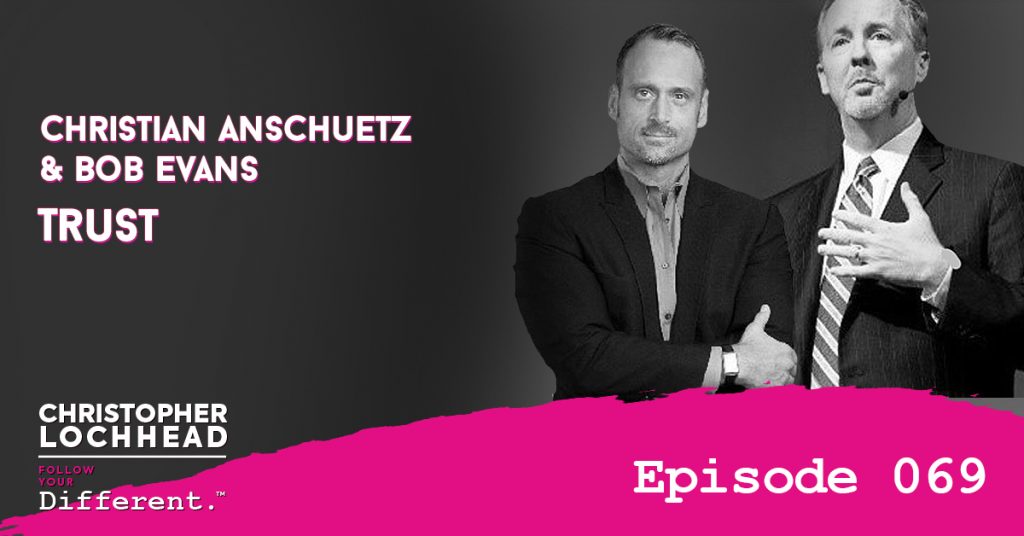
Podcast: Play in new window | Download (Duration: 1:29:16 — 81.8MB) | Embed
Subscribe: Apple Podcasts | Spotify | Pandora | RSS | More
In this episode, former Marine and Entrepreneur Christian Anschuetz and Bob Evans, host of “Cloud Wars Live” podcast, joins us for a conversation about the connection between trust and happiness. They explore the dichotomy of why trust has never mattered more but remains so low in major institutions.
Trust is Collapsing
The conversation starts about personal definitions of trust and how trust and love coincide. The guests share anecdotes on their personal lives and ultimately, how trust adds to overall happiness in any relationship. Given the background of the guests, the discussion took a quick turn in discussing the trust issues of consumers to institutions.
“Whether it’s on a corporate level or a personal level, who we are, on a large part, is the promise or commitment that we make and whether or not we keep those promises or commitment.” – Christian Anscheutz
According to PR Firm Edleman, only 48% of people trust the government and 47% trust the media. Moreover, The Atlantic says, “Trust Is Collapsing in America.” Major corporations are not exempt from this discussion.
Breaking Promises
At a fundamental level, businesses are expected to have a set of commitments and promises around a product and service. These things make customers come back to the product/brand. However, we live at a time where a lot of major institutions have broken a lot of major promises to consumers, resulting in a massive takedown of trust.
“Trust is being eroded and trust is being created and both seem to be happening on a rocket speed today.” – Bob Evans
Christian and Bob observed that as big companies rise, failure in internal leadership, model setting, and problem recognition also results. It may be an advanced world now. However, these companies have no clue in keeping their customers’ trust.
Overriding Policies
Internally, policies guide management decisions, while externally, policies help the company lead in new markets. However, policies don’t square well most of the time, especially in terms of bridging the gap between the consumer and the company. No matter how much employees want to help consumers, their hands are tied because of certain company policies.
“How do companies fail to see this and how do they fail to act? It’s not a matter of doing stuff a little better or being more efficient. This is survival and death.” -Bob Evans
To further enhance personalization with consumers, Christian and Bob suggest that companies should explore Artificial Intelligence in customer service. AI can understand a consumer’s profile and history. It can contextualize an appropriate response without causing risks for the company.
To hear more about trust from Christian and Bob, download and listen to the episode.
Bios:
Chief Digital Officer, UL
Christian Anschuetz is the Chief Digital Officer (CDO) for UL (formerly known as Underwriters Laboratories) where he is responsible for identifying, prioritizing and embedding technology innovation and digital trends into the vision, strategy, and operating models required to sustain and accelerate the company’s growth. Before assuming the role of CDO, he served as UL’s global Chief Information Officer (CIO).
Before joining UL, Christian was the CIO for Publicis Groupe, the 3rd largest communication company in the world.
In addition to holding several other executive positions, Christian also founded a technology services boutique focused on providing cybersecurity services to firms as early as 1998.
Christian holds degrees from the University of Michigan and Stayer University. He is a proud veteran of the United States Marine Corps and the founder of the innovative nonprofit startup, Project RELO.
Bob Evans
Bob grew up outside of Pittsburg, with hard-working parents and his 6 siblings. He graduated from the University of Pennsylvania in 1978 and entered the business world, flowing his passion for information technology and writing.
He rose to become the editor of Information Week, one of the top two publications in technology at the time. Later on, he became the SVP and Content Director for Information Week’s parent company TechWeb/CMP
After thirty years in the media business, he left to join the world of software vendors, after a quick stop at ERP vendor SAP, Bob was recruited by the world 5th richest person, a legendary category designer and entrepreneur –Larry Ellison the founder of Oracle.
At Oracle Bob served as SVP and Chief Communications Officer for Larry.
Today Bob runs his own strategic communications firm, is a prolific writer, a tech industry commentator, public speaker, and a legendary guy.
He hosts the widely popular Cloud Wars Live Podcast.
Links:
Christian Anscheutz – Linkedin
We hope you enjoyed Bob Evans and Christian Anscheutz on this episode of Follow Your Different™! Christopher loves hearing from his listeners. Feel free to email him, connect on Facebook, Twitter, Instagram and subscribe on iTunes!
065 The Power of Niche Networks w/ Gina Bianchini
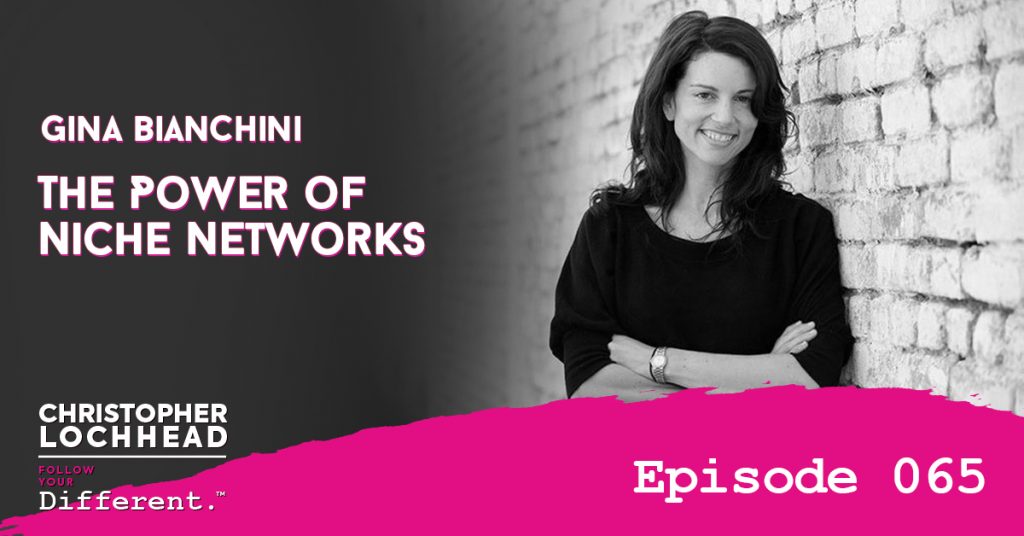
Podcast: Play in new window | Download (Duration: 1:10:10 — 64.3MB) | Embed
Subscribe: Apple Podcasts | Spotify | Pandora | RSS | More
Gina Bianchini is a pioneering entrepreneur in social networking and the founder of Mighty Networks. Today, she speaks again with her bro Lochhead. They talk about building digital communities and why the future is about creating niche networks.
“The more and more isolated that we all feel in our daily lives, the more valuable each and every one of these niche brands and businesses that can create compelling experiences.” – Gina Bianchini
Mighty Networks from a Year Ago
Mighty Networks has always been a platform for creators with a purpose. They cater to people—brands and businesses—that want to bring people together and build relationships. In turn, community members can learn and access content together while creators get paid what they are due.
All of that while helping other people become the best versions of themselves. Which is pretty cool because this is the job that everybody wants today.
On Building Niche Networks
Gina came to realize that the notion of finding one’s niche has become fundamental in social networking. That is, people are not only hungry for discovering their niches. They seek people who can put up niche networks.
“We’re all desperate for smaller, more specialized ways of building relationships, having amazing experiences and gaining expertise. The people that can put that together for us will win in a way that has just not been possible before.” – Gina Bianchini
Niche brands, businesses and creators with a purpose are creating their own worlds to help people. Gina says that the faster we all get to that world, the better off we all will be.
The Value Created by Mighty Networks
In a previous episode, Joe Pine shared with Lochhead the difference between being a company that people save time with and one that people spend time with. He says that Mighty Networks is very well on its way to becoming the latter. That is, if it isn’t already.
“Who you bring together matters as much or more to their experience with your brand and the kind of time they wanna spend with your brand as any single thing that you can do as that creator, as that brand.” – Gina Bianchini
To hear more about niche networks from Gina, download and listen to the episode.
Bio:
Gina Bianchini (Twitter: @ginab) is an entrepreneur, investor and the CEO and founder of Mighty Networks, a new type of social network platform for creating communities.
An early pioneer in social networking, she was CEO of Ning, which she co-founded with entrepreneur and venture capitalist Marc Andreessen.
Prior to Ning, Bianchini was co-founder and president of Harmonic Communications which was acquired by Dentsu.
She has also held positions at CKS Group and Goldman Sachs & Co.
She graduated from Stanford University in 1994 and has been featured on the cover of Fortune magazine, on Charlie Rose and appeared in many top business publications.
Links:
Strategy + Business – The global village needs walls
We hope you enjoyed Gina Bianchini on this episode of Follow Your Different™! Christopher loves hearing from his listeners. Feel free to email him, connect on Facebook, Twitter, Instagram and subscribe on iTunes!
060 Cards Against Humanity Co-Creator Max Temkin
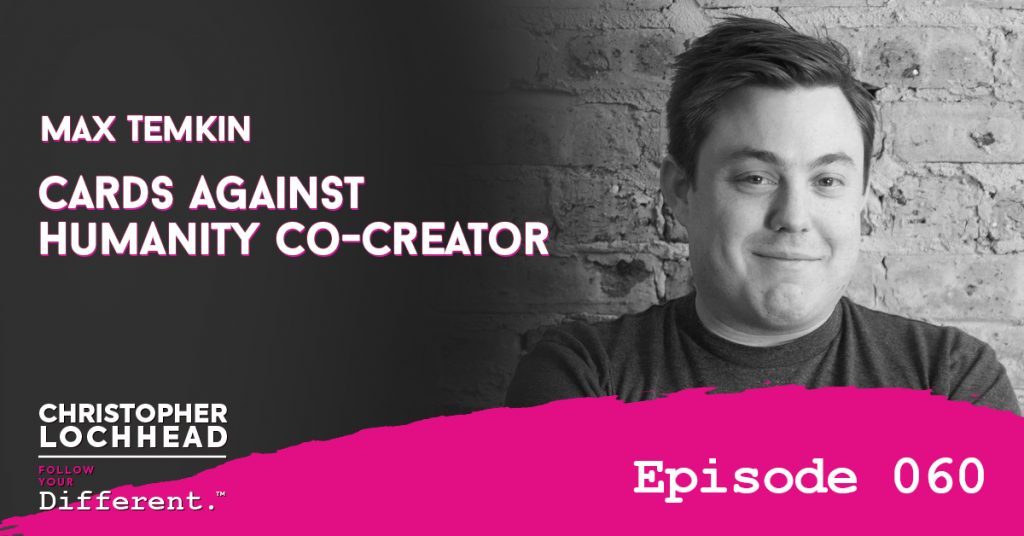
Podcast: Play in new window | Download (Duration: 1:34:02 — 86.4MB) | Embed
Subscribe: Apple Podcasts | Spotify | Pandora | RSS | More
Living legendary designer Max Temkin, co-creator of Cards Against Humanity (“a party game for horrible people”) talks about his ideas on design, company building, his work ethic—or lack thereof—and so much more.
Max’s Non-Existent Work Ethic
Max proclaims himself as a horrible procrastinator with no work ethic. He can never decide to do something and sit down to actually do it. Because of this, he has developed coping mechanisms to get him through last-minute clutch work.
This ties up with the philosophy of necessary and sufficient conditions that he personally believes in.
Working hard is necessary to keep a business running but it is never sufficient. Hard work needs to be coupled with critical thinking, team play and good energy to make legendary things possible.
“No one is successful just because they killed themselves with work.“ – Max Temkin
The Wild Medium: Design
Max says that it is incredibly difficult to break down what it means to be a designer.
After all, so many skills go into design.
There is design thinking, organization and empathy for the user, and then there are the technical skills like typography and color theory.
Because of the many skills that a designer can sink their teeth into, no designer is excellent at everything. It would take more than one lifetime to master them.
For example, Max has never understood color theory, so he stuck to black and white, which eventually became his brand.
“I’ve definitely come to suspect that for many people, what you might call their style is like the coping mechanisms they’ve developed to cover those holes in their skill set.” – Max Temkin
Building Small Things
Max says that people usually build things from the desire to make them just because it would be neat to do so. Some people would put up their creations for the people to decide their fate.
Some would build a company with the mindset of growing its worth into a billion dollars. Max believes that these ideas, however, are rarely delightful and rarely work. In contrast, allowing yourself to think small and unconstrained would help your ideas grow into huge phenomena.
“Very rarely does someone go, ‘I’m gonna change the world with this huge idea’ and then it works exactly as intended.” – Max Temkin
To hear more about design, gaming and the Do By Friday podcast from Max, download and listen to the episode.
Bio:
Max Temkin is a designer.
He is best known for co-creating of the #1 selling, category creating “adult party game” Cards Against Humanity.
He also co-created, Secret Hitler, and Humans vs. Zombies.
Max is also co-host of the popular podcast, “Do By Friday”.
Links:
Cards Against Humanity – Wikipedia
The Sun UK – Cards Against Humanity set to be a shocking quiz show on Comedy Central
PR Week – Cards Against Humanity Gorilla Black Friday Marketing!
The New York Times – Letter of Complaint: Cards Against Humanity
Do By Friday Podcast – Overcast
We hope you enjoyed Max Temkin on this episode of Follow Your Different™! Christopher loves hearing from his listeners. Feel free to email him, connect on Facebook, Twitter, Instagram and subscribe on iTunes!
058 1 Life Fully Lived w/ Tim Rhode
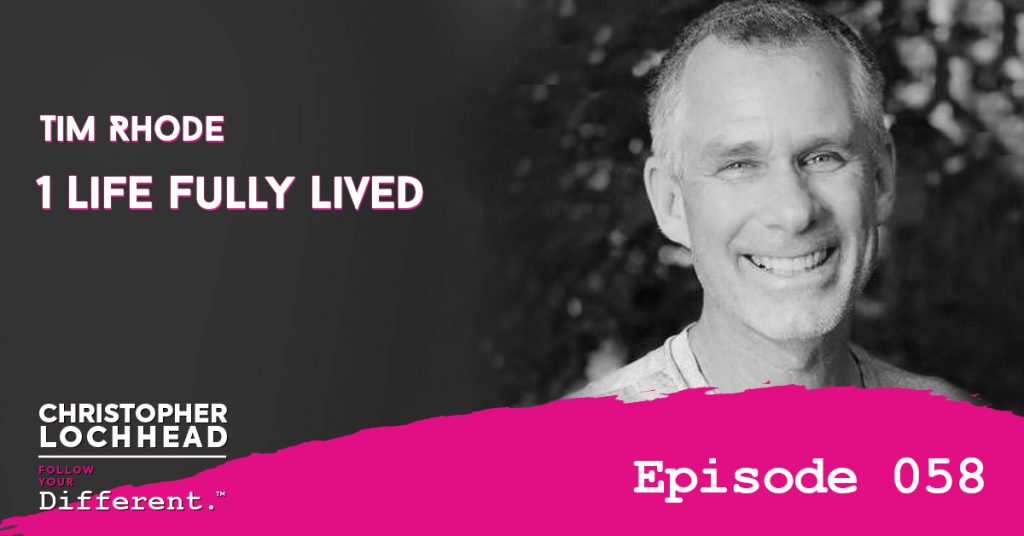
Podcast: Play in new window | Download (Duration: 1:06:46 — 61.4MB) | Embed
Subscribe: Apple Podcasts | Spotify | Pandora | RSS | More
Tim Rhode, founder of the non-profit 1 Life Fully Lived, has helped thousands of people turn their lives around. On this episode, this favorite buddy of Lochhead’s talks about life design, going from entrepreneur to non-profit founder and more.
“Are you living in what we call the one life fulfillment triangle? Where do your passions meet your talents where there’s opportunity in the marketplace?” – Tim Rhode
Transitioning from Entrepreneurship to Non-Profit
Tim did not get a ton of non-profit experience prior to founding 1 Life Fully Lived. He was like any realtor who eventually became a mini-tycoon and founded the organization in a most unconventional way. He did not merely dump his cash in a foundation but was actually very involved in it.
The transition has been an amazing journey. Tim says that he owes it to the many talented people who know who they are and believe in 1 Life Fully Lived. With them, he is able to live every day in a state of flow, always seeking improvement.
“The journey has been getting to know who could most use all of this and how can we best serve—and what’s the real estate term—the highest and best use of 1 Life Fully Lived to help make a difference in a world that can certainly use a 1 Life movement now.” – Tim Rhode
Why People Struggle
Tim points out some of the reasons why people are constantly struggling on top of the economic uncertainties that bog them down.
“They’re struggling because they’re basically being taught to struggle by people who are struggling, not having quite figured it out themselves.” – Tim Rhode
This ecosystem knows nothing but struggle and people can get used to being part of it. Christopher concurs with this. When you grow up in such an environment, it is all you are going to think life is about.
Designing a Best Life
To overcome the ceaseless struggle, people need to be exposed to new ideas, thought processes and good role models. These models will then spark the question of what-could-be in those who are stuck and have yet to find their footing.
Most schools teach us that getting a degree and doing well on SATs is the only way to become successful in life. However, 1 Life Fully Lived seeks to shake up that system and teach people valuable entrepreneurial skills. And in so doing, they hope these people would have not only financial freedom by the time they’re old and gray but also the health and vitality to still “get the goods in the woods.”
To hear about people doing great things alongside with Tim and how to create a diverse, mission-driven network of people, download and listen to the episode.
Bio:
Tim Rhode sold over 2,500 homes when from 1986 to 2000. He bought and sold over 100 properties and coached more than 200 investing students for foreclosures.com.
Today, Tim is the founder of non-profit, 1 Life Fully Lived and co-founder of men’s mastermind group GoBundance where he helps thousands live their best lives.
Links:
We hope you enjoyed Tim Rhode on this episode of Follow Your Different™! Christopher loves hearing from his listeners. Feel free to email him, connect on Facebook, Twitter, Instagram and subscribe on iTunes!
057 Connected Strategy w/ Christian Terwiesch
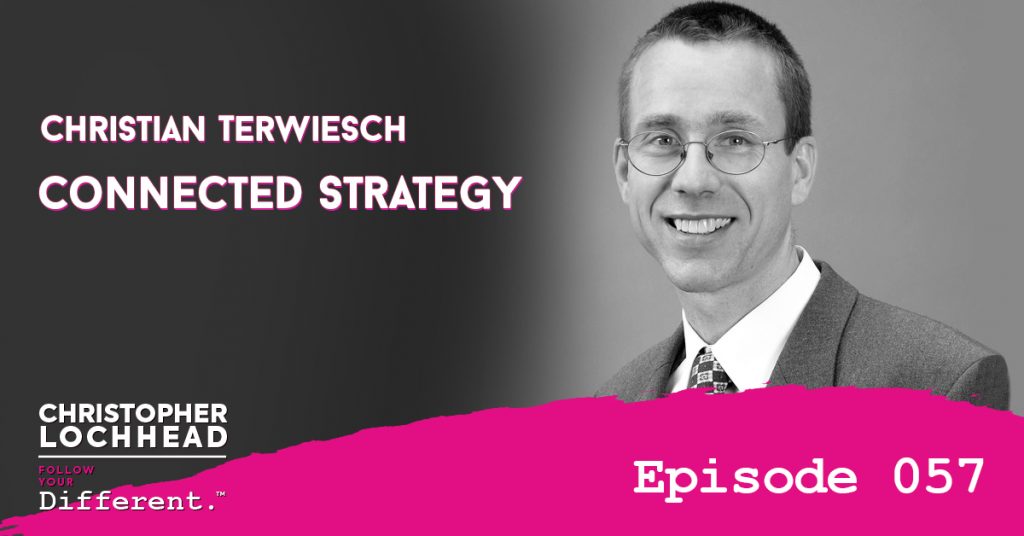
Podcast: Play in new window | Download (Duration: 1:00:03 — 55.2MB) | Embed
Subscribe: Apple Podcasts | Spotify | Pandora | RSS | More
Professor Christian Terwiesch gets in touch with Lochhead for a remarkable conversation about connected opportunities in the customer journey. They dig into his new book, Connected Strategy, which looks into new forms of connectivity that can build legendary interactions with customers.
“What would it take that you blow this tradeoff away and you can have a higher efficiency, low fulfillment cost interaction with the customer and still delight the customer?” – Professor Christian Terwiesch
First Things First: Customer’s Perspective
In order for connected strategies to happen, business leaders should first think about the customer’s perspective. It is important to know the product and service that you want to provide them. And even more important is knowing the customer’s motivations for availing of your product.
For example, a shoe designer can spend tons of money on R&D and marketing to build relationships with retail stores. And even then, they could fail miserably at understanding their customers’ pain points. After all, the company that focuses on just the shoe itself will not be able to deliver quality customer journey.
“The customer’s pain points are not about just buying the shoe and having a great shoe. There’s a much bigger aspiration that this runner potentially has—feeling good, running their first marathon.” – Professor Christian Terwiesch
Connected Customer Journeys
A term that Professor Terwiesch is particularly fond of is “consumption shame”, called “customer journey” in his book. This reminds us that people do not wake up in the morning and say they want our product.
They first have to realize the need, which may be initially latent, for a product. From there, they can make the choice and finally buy the product. This journey, a form of engagement and experience, is made of weaved and repeated interactions.
“It’s weaving those disjoint experiences together, so that you and I—my firm and you—will have a relationship that goes much longer than one episode.” – Professor Christian Terwiesch
Recognize, Request, Respond, Repeat
Lochhead also shared his own experience after a recent purchase of podcasting equipment. A representative rang him up, asked some questions about his purchase, and then offered to help him directly should he have concerns. Christopher also received an email containing links to the shop’s FAQs page, which completely blew him away.
A company’s personal touch shows the embeddedness of the moment of purchase in a longer customer journey. There could also be a similar experience for other customers before they make the purchase. Four stages in the journey that could use such connected strategies are the moments when customers recognize, request, respond and repeat their interaction with the product.
To hear more about connected strategies from Professor Terwiesch and how you can utilize them, download and listen to the episode.
Bio:
Christian Terwiesch is a professor of Operations and Information Management at Wharton and co-directs Penn’s Mack Institute for Innovation Management.
With extensive experience in MBA teaching, online courses, and executive education.
Professor Terwiesch has authored several books, and published in many of today’s leading academic journals, from Management Science to The New England Journal of Medicine.
He also hosts the national Sirius XM radio show Work of Tomorrow. He holds a doctoral degree from INSEAD and a Diploma from the University of Mannheim.
Links:
OID, Wharton School – University of Pennsylvania Profile
Executive Education, Wharton School – University of Pennsylvania Profile
Speaker Booking Agency Profile
We hope you enjoyed Professor Christian Terwiesch on this episode of Follow Your Different™! Christopher loves hearing from his listeners. Feel free to email him, connect on Facebook, Twitter, Instagram and subscribe on iTunes!
054 Claude VonStroke Legendary DJ & Music Entrepreneur
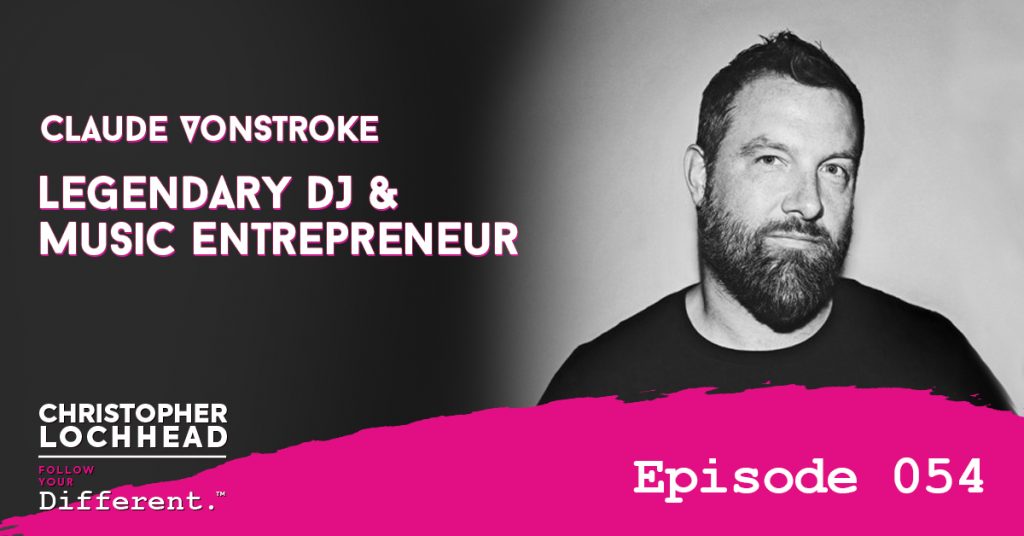
Podcast: Play in new window | Download (Duration: 1:04:11 — 59.0MB) | Embed
Subscribe: Apple Podcasts | Spotify | Pandora | RSS | More
Hailed as the best DJ in America, Claude VonStroke regularly performs for five to ten thousand people and even more.
He shares his origin story, how his truly genius and original plan to learn from the best DJs made him America’s #1 DJ and how worked for 15 long years to make his dreams come true.
“I’m trying to tell you that going after the golden goose isn’t always the best path to success… only a few can get lucky so we don’t even try to go that route. We just try to be legit. We just try to be who we are, and because we do that, it works.“ – Claude VonStroke
Claude’s Early Foray into Music
In an industry that celebrates mostly teenage geniuses, Claude stands out as someone who did gain music production until he was about 32. He grew up in a realm where a youngster could not just find anything on the Internet. Nobody in the neighborhood played the music he wanted to create so he had to forge an unusual path.
“There’s no generational group of artists, every six years flipping over, that’s showing another group of younger people that, ‘Oh, you can be a huge techno DJ from Milwaukee.’” – Claude VonStroke
Cleveland-born, Claude’s musical influences evolved after moving to Detroit. From listening to Uncle Vic playing Journey in Cleveland, he went on and began listening to The Electrifying Mojo’s playlist of Prince and Run-DMC. As the kind of kid who was obsessed with listening to the radio every night, these artists shaped his music taste.
Fifteen Years in the Making
Claude didn’t always want to make music. In the past, he also wanted to be a film director. He took a solid fifteen years to realize that he “sucked” at the project and people management aspect of filmmaking.
“The path is just totally different. It’s like you need to be a real manager of personalities to be a great filmmaker. But to be a musician, you just kinda have to learn to manage yourself.” – Claude VonStroke
Music remained in the closet for years.
Claude knew he was good at it but he didn’t want to admit it and didn’t see that DJing could be a job. He didn’t start going to underground raves until he was 23.
A Genius Plan to Learn
To overcome the fact that he did not know anybody in the music industry, Claude put to use his filmmaking talent. He decided to make a documentary about some techno music and every music DJ who came to San Francisco after moving from Detroit.
In a fascinating turn of events, his inability to license songs forced him to make music that sounded like his interviewee’s. By the end of it, he not only got every single piece of information about these DJs. He learned to make the songs that they made, and the rest is history.
“My first record was big because I’ve been bottled up for 20 years waiting to release a huge record.” – Claude VonStroke
To hear more about Claude’s story of creativity, entrepreneurship and massive risk-taking, download and listen to the episode.
Bio:
Barclay Crenshaw (a.k.a. Claude VonStroke)
- DJ Magazine says he is the best DJ In America
- Billboard Magazine says his label, Dirty Bird is one of the top 5 Independence Dance Labels
- Mix Magazine named Dirty Bird the label of the decade
- He’s also got a critically acclaimed Radio Show and podcast called “The Birdhouse”
In this day and age of music cross-pollination, Claude VonStroke sits at the forefront of all that is good, proper and most importantly, fun.
VonStroke is just as relaxed in his home studio building beats as he is dropping massive underground records in a room filled by thousands.
DJ-wise, his relentless touring of every major city, festival and basement after-party around the world has only enriched his unique perspective on music.
As the owner of the record label, DIRTYBIRD, Claude also built an impeccable A&R roster signing acts like Justin Martin, Julio Bashmore, Catz n Dogz, Riva Starr, Tim Green, Breach, Eats Everything, Shadow Child and Shiba San, well before they broke out of their hometown scenes. (And even naming a few of these artists.)
Today, DIRTYBIRD continues to surprise and innovate in the underground dance scene, releasing an enigmatic combination of house, funk, dirty-bass and electronica.
Sonically, VonStroke has released three original artist albums, a remix album and several high profile mix and remix compilations.
Highlights include working with and on records for Bootsy Collins, Rihanna, Disclosure and Green Velvet as well as a few number #1 & #2 hits on Beatport.
Most importantly, VonStroke has kept it original, fun and funky.
A lot of his success can be attributed to a good attitude. Claude does not scowl and look mean while he DJs.
He does not pretend to know everything and he truly loves his fans.
He is grateful to be curating, creating and performing music for a living and he knows that the reason people go to parties is to shake their booty and have fun.
Catch him play at numerous festivals, clubs or even better at his legendary DIRTYBIRD BBQ series of outdoor events.
Links:
10 MOMENTS THAT DEFINED CLAUDE VONSTROKE
Meet the Women Running One of Electronic Music’s Biggest Labels
The 5 Best Independent Dance Labels of 2017
#1 Label of the Decade, Mix Mag
We hope you enjoyed Claude VonStroke on this episode of Follow Your Different™! Christopher loves hearing from his listeners. Feel free to email him, connect on Facebook, Twitter, Instagram and subscribe on iTunes!
051 Should I Start a Business?
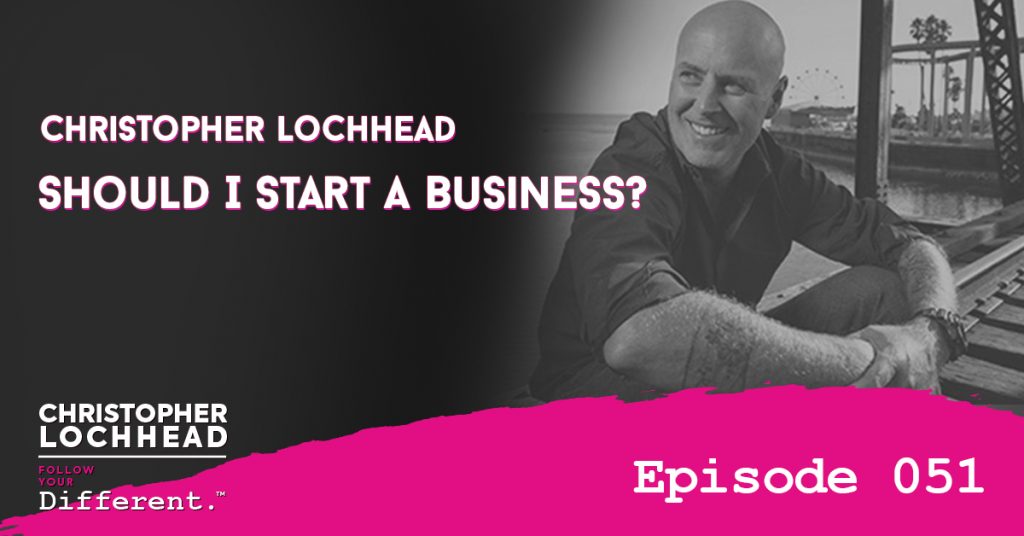
Podcast: Play in new window | Download (Duration: 7:55 — 18.4MB) | Embed
Subscribe: Apple Podcasts | Spotify | Pandora | RSS | More
On today’s special episode, Christopher answers a question from a young woman who wants to know whether she should start a business. He touches on two points: the effect of formal education on entrepreneurial success and the distinction between missionaries and mercenaries.
Entrepreneurship is Not for Everybody
Christopher received an email from a 20-year-old woman thinking about leaving school to starting a business. Perhaps inspired by his own story, she sought out his help.
With very few options after getting thrown out of school at 18, Christopher started a business. Entrepreneurship was a way out of a life of struggle for him. However, even a huge proponent of entrepreneurship like Christopher thinks it is not the answer for everybody.
“It’s an interesting thing that for many entrepreneurs, entrepreneurship is the only root that we have.” – Christopher Lochhead
Education Remains Valid for Most
The first thing that you should ask yourself when you consider quitting school to start a business is whether you are really ready. True, a lot has been said about success after dropping out and how college is slowly dying.
But according to the Kauffman Foundation, adults without formal education are much less likely to be entrepreneurs than their educated counterparts. Research also shows that the more educated you are, the more you are going to make. While the media portrays lots of dropout-turned-rockstar tales, the truth is that most entrepreneurs get some education.
“This is coming from a guy who didn’t go to school. but I think you need to think twice before dropping out because for most people, school pays off.” – Christopher Lochhead
Are You on a Mission?
Another question to ask: are you a missionary or a mercenary? Christopher’s buddy Eddie Yoon makes this very important distinction. If you are the latter, then you are going to tap out when it gets hard.
There will be massive losery along the way and the disappointments will be huge. Things that will make you want to quit will happen on a fairly regular basis. Being mission-driven, like what most top VCs dub successful entrepreneurs, is the way to charge forward.
“Your commitment to the mission is what will get you through the hard parts. And there will be hard parts and the hard parts will be way worse than anybody ever expressed to you.” – Christopher Lochhead
To hear more about Christopher’s take on whether you should start a business, download and listen to the episode. Got a question for Christopher? Email him at bl*******@******ad.com.
Link:
Quora – What would be your advice for a 21-year-old starting a company?
We hope you enjoyed this episode of Follow Your Different™! Christopher loves hearing from his listeners. Feel free to email him, connect on Facebook, Twitter, Instagram and subscribe on iTunes!

